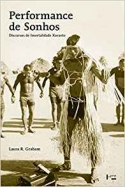The new Portuguese translation of a book originally published in 1995 by University of Iowa Professor of Anthropology Laura R. Graham. In addition to an extensive preface that informs readers of changes since the English edition, this edition includes a new audio CD of acoustic/audio examples from original and unpublished field recordings, which bring alive textual examples in the book.
From the English edition dust cover:
Over several centuries the Xavante people of central Brazil have maintained an invincible sense of identity and feeling of control over historical processes, despite repeated invasions by colonists and settlers, capitalist commercial ventures, and in the 1980s an enormous government-sponsored mechanized agricultural project. In this award-winning discourse-centered study, now translated into Portuguese and acoustically illustrated with stunning audio recordings from her original fieldwork, Laura Graham explores how the Xavante use the ritual performance of myths and dreams to maintain their culture despite these disruptive outside forces.
At the heart of this compelling book is an extraordinary performance, in which an elder and community leader tells his dream of an encounter with the creators. Graham analyzes the various components of his performance – narrative, myth-telling, song, and dance – and considers the entire community’s participation in the preparations, rehearsal, and public performance of the dream, including their adaptation to her presence and modern technologies of ethnographic documentation.
From this analysis, Graham astutely demonstrates how the practice of myth-telling is an essential element in cultural continuity and the creation of social memory. Through expressive performance, Xavante create a remarkable sense of agency in responding to historical events. The myth-teller also attains a kind of immortality. These findings will be of interest not only to students of South American cultures and linguistics but also to everyone intrigued by the role of myth and dreams in social life and social change.
This book is winner of the Chicago Folklore Prize jointly awarded by the American Folklore Society and the University of Chicago (1996), the Hans Rosenhaupt Memorial Book Award awarded by the Woodrow Wilson Foundation (1997), and Honorable Mention for the Victor Turner Prize for Ethnographic Writing (1996).
From the Chicago Folklore Prize Committee:
Graham's finely crafted ethnography situates the expressive performance of dreams in Xavante soundscape, discursive practices, negotiations, rituals, and narrations. . . . Her field and translation work is presented as a collaborative process that illustrates the creative power of named individuals who engage one another and the ethnographer in a range of expressive practices that constitute the discourses of immortality. Graham respects and appreciates these discourses in both oral and mediated traditions and argues persuasively for the importance of cultural identity to survival.
From the Victor Turner Prize Committee:
Graham's book achieves a beautiful balance between the global and the local. . . . This is an engaged anthropology that takes into account the politics of indigenous people's relations to the state and the political implications of fieldwork in such a context. At the same time, Graham grapples with the ways that a rich and complex indigenous cosmology informs political interactions in often disarming ways. This stunning book represents ethnography at its best.
